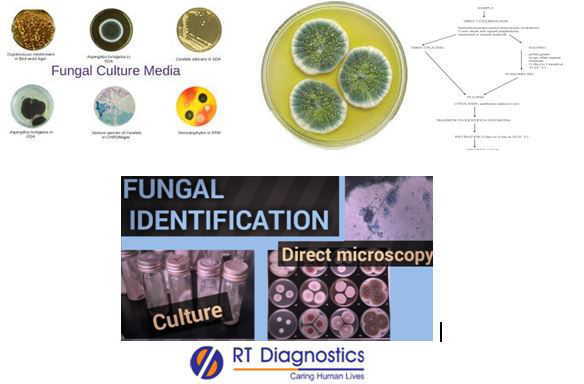Culture & Sensitivity – Fungus:
Why Culture and Sensitivity – Fungal Test?
CLINICAL INFORMATION
Fungi are microbes that exist in nature (single-celled - yeast, branched filamentous - molds). Most of them are harmless but a few types are infectious. Modes of the spread of fungal infection in humans include contact with contaminated soil and or decaying plants/rotting woods (i.e organic decaying of moist/damp leaves or rotting woods on wet soil), animal bite or scratch (often cats), unhygienic habits such as sharing clothes from other fungal infected people (skin), unsanitary food preparations, weak immune system (immunocompromised) eg. HIV/AIDS, patient under immune suppressive medications, etc. Some of the sample specimens include blood, skin, nails, mucosal surfaces – such as wounds or the fungal infected genital regions, etc. Common types of fungal infections include tinea infections eg. tinea corporis (ringworm), tinea pedis (athlete's foot), tinea cruris (jock itch), etc. There are two types of fungal infections – Superficial (affecting the parts of the outer body) and systemic (affecting systems inside the body eg. Lung etc). Typical signs and symptoms of a fungal infection in the skin are itchy, red skin, and scales. The nail infection may show symptoms of yellow, thick, and brittle nails. Signs of fungal infection of the mouth (oral candidiasis with oral thrush) include white patches on the tongue, inner cheeks, and gums. Vaginal infection of the fungi may show vaginal discharge and itching. Symptoms of a systemic fungal infection include fever, muscle aches, headaches, chills, nausea, rapid heartbeat, etc. Specimen collection depends on the type and site of fungal infection manifested in the patient. Superficial infection– specimen may be skin or nail scraping, oral or vaginal infection– the special swab is used to collect tissues or fluid from a suspected infected part like mouth or vagina, tissue biopsy, etc. A blood test is used to detect the presence of fungi in the blood eg. During a systemic infection (such as septicemia) antigen/Antibody testing eg. ELISA etc. A urine test may be performed for vaginal infections or UTI etc. Sputum specimen is preferred in thick coughed up sputum that may help to diagnose fungal infection in the lungs. In a few cases, the symptom of a fungal infection (systemic infection) might mimic bacteria or viral infection. Moreover when medications such as antibacterial and/or antiviral drugs when proven ineffective, then physicians may suspect a fungal infection and hence may order a fungal culture and sensitivity test for differential diagnosis to rule out the chances of other pathological causes behind the infection. Fungal Culture and Sensitivity Test – help for diagnosis of a fungal infection (culture tests) to detect the presence, type of pathogenic fungi causing the infection, and also for prognosis (sensitivity tests) during treatment. Additional tests include microscopic examination (eg. KOH i.e potassium hydroxide preparation, Calcofluor white stain), antigen or antibody testing in a blood specimen, molecular testing, histo-pathological tests (tissue biopsies), CSF specimen (meningitis) with symptoms of severe persistent headaches, stiff neck, sensitivity to light, etc.

General Instructions:
Sample Requirement: Specimen – As guided by the physician or the pathologist. Test Preparation: None.
NOTE - Sample for specimen collections may vary based on the patient’s condition/cases according to the patient’s presenting complaints/signs or symptoms:
SPECIMEN REQUIREMENT (Special or Rare Cases) - As instructed and guided by Physician / Clinician / Pathologist / as per Laboratory’s requirements, according to procedures and protocols.
Sample Requirement: As guided by the physician or the pathologist.
Test Preparation: None
This Multi-Specialty Clinical Referral Laboratory RT DIAGNOSTICS provides precise and accurate tests with an extensive range of testing services to the medical centers to help in the diagnosis and identification of pathology in the test specimens for infectious diseases and also to evaluate the function of organ systems of the patient. It prevents further complications and helps to stabilize and restore health to near normalcy at the earliest without delay.



